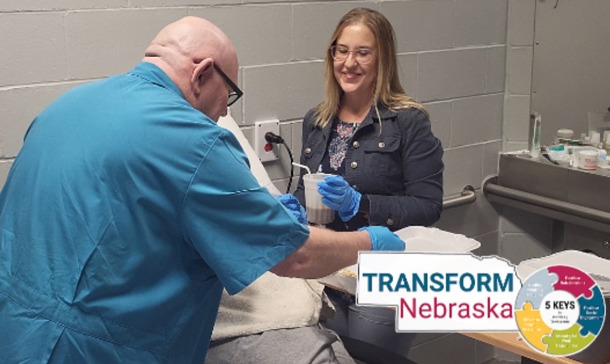NDCS Launches Hospice Care Volunteer Program

November 4, 2024 (Lincoln, Neb.) – The Nebraska Department of Correctional Services (NDCS) has launched a program aimed at bringing transformative change to end-of-life care in Nebraska correctional facilities.
The hospice care volunteer program engages peers to provide companionship and emotional support, assist with daily activities, and stand vigil with terminally ill patients to ensure they are not alone in their final moments. Volunteers are selected from the general population at the Reception and Treatment Center (RTC) who apply and meet the program’s criteria.
Designed with a holistic approach to end-of-life care, volunteers work in collaboration with NDCS team members and healthcare providers to addresses the physical, emotional, and spiritual needs of incarcerated individuals who have a terminal diagnosis. Individuals typically spend a couple hours each day volunteering for this program, allowing them to also maintain employment within the facility and participate in programming.
“Prioritizing the development and well-being of individuals in our care is what the NDCS ‘TRANSFORM Nebraska’ framework is all about,” said NDCS Director Rob Jeffreys. “This program is a tremendous example of a community with compassion within Nebraska’s correctional facilities.”
The first cohort of 16 volunteers completed 10 weekly trainings, delivered by healthcare professionals. The trainings covered various aspects of hospice care including communications skills with patients, families, and healthcare professionals; providing emotional support; maintaining boundaries and confidentiality; end-of-life care principles and pain management; and self-care and stress management for volunteers.
Through this program, volunteers develop valuable skills such as empathy, communication, and emotional resilience, along with contributing to a meaningful mission.
“Not only are there positive outcome measures for the terminally ill patient, but there are positive outcomes for the volunteers themselves,” said Lori Palik, director of nursing at RTC. “This program affects them just as deeply as it does the families and the patients.”
Volunteers extend their support throughout the entire end-of-life journey, forming connections with patients well before the final stages of hospice care, becoming trusted confidants, guiding patients through deeply personal end-of-life discussions, and helping to clarify and fulfill their final wishes.
The program was launched at RTC in Lincoln. Equipped with a skilled nursing facility, including rooms designated for hospice care, RTC is the center of excellence for healthcare services at NDCS.
